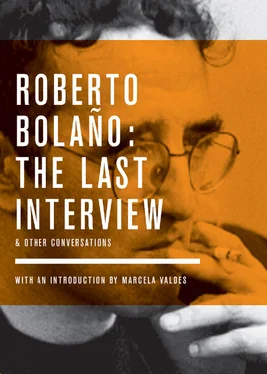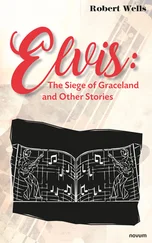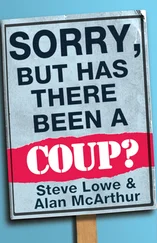A Mexican poet, Amado Nervo (1870–1919) was among the vanguard of nineteenth century Mexican poetry.
MM:Will Lautaro be a writer?
RB:I hope only that he’s happy. Thus, it would be better if he were something else. Airplane pilot, for example, plastic surgeon or editor.
MM:What do you recognize in him as your own?
RB:Luckily he resembles his mother much more than me.
MM:Do you worry about the position of your books on bestseller lists?
RB:Minimally.
MM:Do you think about your readers?
RB:Almost never.
MM:Of all the things your readers have said about your books, what has moved you the most?
RB:Quite simply, the readers themselves move me — the ones who dare to read Voltaire’s Philosophical Dictionary , which is one of the most pleasant and modern works I know. I’m moved by the steely youth who read Cortázar and Parra, just as I read them and intend to continue reading them. I’m moved by those youths who sleep with a book under their head. A book is the best pillow that exists.
MM:What things have made you angry?
RB:At this age, getting angry is a waste of time. And, regrettably, time matters at my age.
MM:Have you ever feared your fans?
RB:I’ve feared Leopoldo María Panero’sfans. On the one hand, he seems to me one of the three best living poets in Spain. During a cycle of readings organized by Jesús Ferreroin Pamplona, Panero closed the cycle and as the day of his reading neared, the neighborhood where our hotel was began to fill with freaks who looked like they had recently escaped an insane asylum. But on the other hand, they were the best readership any poet can aspire to reach. The problem was that some didn’t just look crazy but like murderers too. Ferrero and I were afraid that at any moment someone might get up and say they had killed Leopoldo María Panero, then fired four shots at the head of the poet; and while they were at it, one at Ferrero and the last one at me.
MM:How does it feel to be regarded as the Latin American writer with the most promising future by critics like Darío Osses?
RB:It must be a joke. I am the Latin American writer with the least promising future. But on that point, I am the type with the most past, which is what matters anyway.
A Spanish poet, Leopoldo María Panero (b. 1948) was infamous for his wild lifestyle. Five of his poems were published in English translation in the Spring 2009 issue of eXchanges .
Jesús Ferrero (b. 1952) is a Spanish novelist, poet, and playwright. His major works include Bélver Yin (1981) and Las noches rojas (2003).
Darío Oses (b. 1949) is an important Chilean literary critic, specializing in the literature of the 1990s.
MM:Does the critical book being prepared by your compatriot Patricia Espinosaarouse your curiosity?
RB:Not at all. Apart from how I’ll end up in her book, which I don’t suppose will be very good, Espinosa seems to be a very good critic. But her work is necessary in Chile. In fact, the need for new critics — let’s call her that — is urgent all over Latin America.
MM:And what about the Argentine Celina Mazoni’sbook?
RB:I know Celina personally and I’m very fond of her. I dedicated one of the stories from Putas Asesinas to her.
MM:What bores you?
RB:Empty discourse from the left. I take for granted the empty discourse from the right.
MM:What entertains you?
RB:To see my daughter Alexandra play. To eat breakfast at a bar by the sea and to eat a croissant while reading the paper. Borges’ literature. Bioy’s literature. Bustos Domecq’sliterature. Making love.
A professor of literary criticism at the University of Chile, Patricia Espinosa wrote a critical essay on Bolaño in 2003 entitled “Bolaño, un poeta junto al acantilado” (Bolaño, A Poet Close to the Cliff).
An Argentine writer, Celina Manzoni is a co-author of Roberto Bolaño: La escritura como tauromaquia (Roberto Bolaño: Writing as Bullfighting).
H. Bustos Domecq was a pseudonym used by Borges and Bioy Casares for collaborations.
MM:Do you write by hand?
RB:Poetry, yes. For the rest, I use an old computer from 1993.
MM:Close your eyes. Out of all the landscapes you’ve come across in Latin America, what comes to mind first?
RB:Lisa’s lips in 1974. My father’s broken-down bus on a desert road. The tuberculosis wing of a hospital in Cauquenes and my mother telling my sister and I to hold our breath. An excursion to Popocatépetl with Lisa, Mara, Vera and someone else I don’t remember. But I do remember Lisa’s lips, her extraordinary smile.
MM:What is heaven like?
RB:Like Venice, I’d hope, a place full of Italian men and women. A place you can use and wear down, a place that knows nothing will endure, including paradise, and knows that in the end at last it doesn’t matter.
MM:And hell?
RB:It’s like Ciudad Juárez, our curse and mirror, a disturbing reflection of our frustrations, and our infamous interpretation of liberty and of our desires.
MM:When did you know you were gravely ill?
RB:In 1992.
MM:What change did your illness have on your character?
RB:None. I knew I wasn’t immortal, which at thirty-eight it was high time I learn.
MM:What do you wish to do before dying?
RB:Nothing special. Well, clearly I’d prefer not to die. But sooner or later the distinguished lady arrives. The problem is that sometimes she’s neither a lady nor very distinguished, but, as Nicanor Parra says in a poem, she’s a hot wench who will make your teeth chatter no matter how fancy you think you are.
MM:Whom would you like to encounter in the hereafter?
RB:I don’t believe in the hereafter. Were it to exist, I’d be surprised. I’d enroll immediately in some course Pascal would be teaching.
MM:Have you ever thought about committing suicide?
RB:Of course. On one occasion I survived precisely because I knew how to kill myself if things got any worse.
MM:Have you ever believed you were going crazy?
RB:Of course, but I was always saved by my sense of humor. I’d tell myself stories that made me crazy with laughter. Or I’d remember situations that made me roll on the ground laughing.
MM:Madness, death and love. Which of these three things have you had more of in your life?
RB:I hope with all of my heart that it was love.
MM:What makes your jaw hurt laughing?
RB:The misfortunes of myself and others.
MM:What things make you cry?
RB:The same: the misfortunes of myself and others.
MM:Do you like music?
RB:Very much.
MM:Do you see your work the way your critics and readers see it: The Savage Detectives above all, then all the rest?
RB:The only novel that doesn’t embarrass me is Amberes , maybe because it continues to be unintelligible. The bad reviews it has received are badges of honor from actual combat, not skirmishes with simulated fire. The rest of my “work” is not bad. They’re entertaining novels. Time will tell if they’re anything more. For now, they earn money, get translated and help me make very generous and kind friends. I can live, and live well, off literature, so complaining would be gratuitous and unfounded. The truth is I concede very little importance to my books. I am much more interested in the books of others.
Читать дальше












